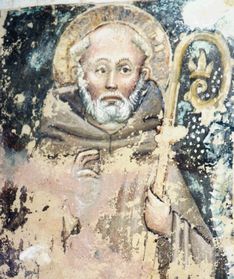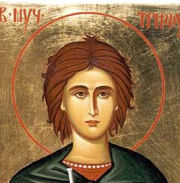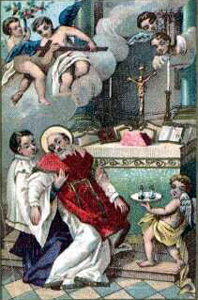St Andrew, Apostle
 The feast of St. Andrew has been kept since the fourth century on November 30th.
The feast of St. Andrew has been kept since the fourth century on November 30th.
St. Andrew was both an apostle and a martyr. The Collect tells us that he was called to govern and teach the Church; and the Epistle and the Gospel deal with the vocation of him who was the first among the apostles to know Jesus Christ. When he was called, he immediately left his nets to become a fisher of men (Gospel), and "his sound hath gone forth into all the earth to preach the gospel of peace" (Epistle). After the coming of the Holy Ghost he preached in Palestine, and then in Scythia, Epirus and Thrace.
"But all have not obeyed the Gospel " (Epistle), and St. Andrew ere long became the apostle of the cross. The priests of Achaia describe his martyrdom at Patras. He died On that special form of cross which has ever since been called after him, and " the Lord received his sacrifice in the odour of sweetness " (Alleluia). His body, having been first taken to Constantinople, was in 1210 moved to the Cathedral at Amalfi, in the kingdom of Naples. In 1462 his head was placed by Pius II in the basilica of St. Peter, his brother. His name is inscribed in the Canon of the Mass (first list, p. 973). St. Andrew is the patron of Scotland.
Let us, with St. Andrew, follow Christ even to the cross.

Mihi autem nimis honorati sunt amici tui, Deus: nimis confortatus est principatus eorum. * Domine probasti me et cognovisti me: tu cognovisti sessionem meam et resurrectionem meam.
Majestátem tuam, Dómine, supplíciter exorámus: ut, sicut Ecclésiae tuae beátus Andréas Apóstolus éxstitit praedicátor et rector; ita apud te sit pro nobis perpétuus intercéssor.We humbly beseech Thy majesty, O Lord, that as blessed Andrew the apostle was both a preacher and a rule of Thy Church, so he may unceasingly intercede for us with Thee.
(Collect)
Catholic Encyclopaedia on St Andrew: http://www.newadvent.org/cathen/01471a.htm
To me, Thy friends, O God, are made exceedingly honourable; their principality is exceedingly strengthened. * Lord, Thou hast proved me and known me: Thou hast known my sitting down and my rising up.
(Psalm 138:17 and 1-2, from the Introit of Mass).Majestátem tuam, Dómine, supplíciter exorámus: ut, sicut Ecclésiae tuae beátus Andréas Apóstolus éxstitit praedicátor et rector; ita apud te sit pro nobis perpétuus intercéssor.We humbly beseech Thy majesty, O Lord, that as blessed Andrew the apostle was both a preacher and a rule of Thy Church, so he may unceasingly intercede for us with Thee.
(Collect)
Catholic Encyclopaedia on St Andrew: http://www.newadvent.org/cathen/01471a.htm


























